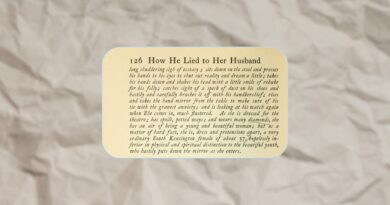English Translation of Three Turkish Poems by Nazım Hikmet Ran & Necip Fazıl Kısakürek
English Translation of Three Turkish Poems by Nazım Hikmet Ran & Necip Fazıl Kısakürek
It is hard to impress people using words alone. Writers have always sought the ways to do so. You may try to depict the moment you helplessly observe around you, feeling pain; you may prefer exaggerating dramatically, or you may imply that your apathy is actually the strongest emotional reaction man can give.
Here I attempt to translate three love poems by two prominent, ideologically opposite figures in Turkish literary history. They are what I love to read. I believe the poets captured the glimpses of the moments I described, respectively.
A Separation Story
Target Text
English Translation
A Separation Story
The man said to the woman
– I love you,
but do you know how?
As squeezing my heart
Like a glass shard
my palms are torn apart,
fingers are all in blood
As if I shred,
go mad…
The man said to the woman
– I love you,
but how?
Deep in miles
Over mountains and Niles
Straight as the crow flies
A hundred percent or
A thousand may be more
With no limit or score.
The woman said to the man:
– I looked
with my lips, heart and head
by loving, scaring and bend
to your lips, heart and head
you taught me
whatever I say now, as a whisper in darkness, …
And now,
I know that
Soil
just as a mother with the face of sun,
breastfeeds
the last and the most beautiful one of her kids.
Alas, however I try,
my hair got tangled with
the fingers of the one who is about to die.
it is impossible
to pull my head even a bit!
You must get over
and walk
By looking into
the eyes of the newborn baby…
You must walk,
and leave me…
The woman stopped.
They hugged
A book fell on the floor
Someone slammed a door
They broke up
Source Text
Turkish Poem:
Bir Ayrılış Hikayesi
Erkek kadına dedi ki:
– Seni seviyorum,
ama nasıl?
avuçlarımda camdan bir parça gibi kalbimi sıkıp
parmaklarımı kanatarak
kırasıya,
çıldırasıya…
Erkek kadına dedi ki:
– Seni seviyorum,
ama nasıl?
kilometrelerce derin, kilometrelerce dümdüz,
yüzde yüz, yüzde bin beşyüz
yüzde hudutsuz kere yüz…
Kadın erkeğe dedi ki:
– Baktım
dudağımla, yüreğimle, kafamla;
severek, korkarak, eğilerek,
dudağına, yüreğine, kafana.
Şimdi ne söylüyorsam
karanlıkta bir fısıltı gibi sen öğrettin bana…
Ve artık
biliyorum:
Toprağın
Yüzü güneşli bir ana gibi
En son, en güzel çocuğunu emzirdiğini…
Fakat neyleyim
saçlarım dolanmış
ölmekte olanın parmaklarına
başımı kurtarmam kâbil
değil!
Sen
yürümelisin,
yeni doğan çocuğun
gözlerine bakarak…
Sen
yürümelisin,
beni bırakarak…
Kadın sustu.
SARILDILAR
Bir kitap düştü yere…
Kapandı bir pencere…
AYRILDILAR…
By Nazım Hikmet Ran (1933)
Commentary
Nazım Hikmet Ran (1902-1963) is one of the most prominent poets of Türkiye, ever. Naturalist straightforwardness and obvious symbolism are among Nazım’s ultimate powers. I translated what I love myself. Despite the time passed, the last stanza of the poem is still striking for me. My principal aim was to reflect its pure beauty to the English language.
The name of the poem is ‘Bir Ayrılış Hikâyesi,’ and its translation is quite literal. The original poem and the translation were written without measure. The rhyme in both does not follow a pattern.
In the translation of the first speech of the man, there were no substantial transformations in the expressions. In the translated poem, more rhymes were used. I think it can be accepted as a low-rank ‘compensation’ for the taste of Nazım’s direct and strong discourse that cannot be translated.
The man’s second speech in the source includes more rhymes. Translation of this part includes certain tough translator’s decisions, and it can be said to be ‘re-written in English.’ Rhyme and flow seduced me to ‘try’ expressing the context by using different structures. The woman’s speech, including Nazım’s preferred symbols, was kept rather untouched, almost as machine translations would do. The rhyme in the target poem was also kept less frequent. In this part, in the original, sentences were broken into several lines, maybe, to imply hesitation. I tried to do the same as long as it does not sound weird (to me at least).
In the final stanza, Nazım, as an opera singer who has all voice tricks in store but uses them only when they are necessary, uses rhyme. I changed ‘the window’ with ‘the door’ for the sake of the rhyme in English.
I hope ‘the translation’ can transmit much of the taste and quality of the original poem.
Expected
Target Text
English Translation
Expected
Neither patient waits for the dawn,
Nor grave for a fresh dead body,
Or for a sin the vile Satan,
As desperately I wait thee.
Too late, I don’t want your comeback
I’ve found a new you in your wreck;
Let your shadow on my mind break
Don’t come, it means nothing to me.
Source Text
Turkish Poem:
Beklenen
Ne hasta bekler sabahı,
Ne taze ölüyü mezar.
Ne de şeytan, bir günahı,
Seni beklediğim kadar.
Geçti istemem gelmeni,
Yokluğunda buldum seni;
Bırak vehmimde gölgeni
Gelme, artık neye yarar?
By Necip Fazıl Kısakürek (1937)
Commentary
Necip Fazıl Kısakürek (1904-1983) is one of the all-time highly respected poets of Türkiye. My fundamental aim in translating this poem is to correspond to the poet’s passionate and top-exaggerated way of setting the metaphors in the first stanza. Between the stanzas there was a long period of time of the poet’s life and passion replaced despair in the meantime.
In the original, the rhyme pattern was -a-b-a-b/-c-c-c-b, and there were 8 syllables in each line. I tried to keep the same form in English. Although generally English needs fewer syllables than Turkish (sonnets in general are translated with 7+7=14 measure), I left a couple of extra syllables so that I can elaborate on the metaphors in English.
In the first stanza, I preferred zero articles with the nouns ‘patient’ and ‘grave’ as they are used as concepts broader than simple generalization. I felt that using them in another way would spoil all the strength of the part.
I love to be on the blurry borders of the translator’s decision and the poet’s decision; the original word for ‘dawn’ was ‘morning,’ and I needed to consider it with the rhyming word ‘devil.’ Among a few couples, I decided on ‘dawn’ and ‘Satan’ which were powerful. However, I had to satisfy with an assonance in that case.
‘Vile’ is not what the poet originally said to Satan. It can be accepted as ‘poetic justice’ using extra syllables brings about. And, I would prefer being able to use the word ‘delusion’ instead of ‘mind break’ to refer to the word ‘vehim,’ which is rather older Turkish. I used ‘thee’ although the source uses contemporary Turkish. Finally, I added ‘desperately’ because it was implied in the original.
Overall, I wish this translation could make you read the first stanza several times with contemplation as I do in Turkish.
As Anyone
Target Text
English Translation
As Anyone
Alone with my heart I’ve just discussed;
You’ve become like a breath with no art.
A voice whose echoes are waning past,
In the middle of my empty heart
My love oath has mingled with the past,
I am sure at once it turned to dust
My heart doesn’t feel a bit of disgust
Now you are anyone to my part.
Source Text
Turkish Poem:
Herkes Gibi
Gönlümle baş başa düşündüm demin;
Artık bir sihirsiz nefes gibisin.
Şimdi tâ içinde bomboş kalbimin
Akisleri sönen bir ses gibisin.
Mâziye karışıp sevda yeminim,
Bir anda unuttum seni, eminim
Kalbimde kalbine yok bile kinim
Bence artık sen de herkes gibisin.
By Nazım Hikmet Ran (1920)
Commentary
Compared to the other masters, universal symbols and references that are not peculiar to just the Turkish context make Nazım’s (1902-1963) poems more meaningful to translate.
In the poem “As Anyone” Nazım caught the glimpse that: ‘Silence is the most powerful scream.’ It can be a cliché, but I think the idea that ‘apathy can be the most powerful emotional reaction’ is so true. Nazım examined the issue multilaterally back in 1920.
The measure of the poem in Turkish is 11, and the rhyme pattern for the first stanza is -a-b-a-b (based on rich rhyme, it is -a-a-a-a with the full rhyme) and for the second it is -c-c-c-b. The measure in English translation was arranged to 9, as fewer syllables are needed in English. The rhyme pattern in translation is also -a-b-a-b / -c-c-c-b.
In the first line of the translation, ‘discussed’ was used to refer to ‘considered,’ but I think it was eventually the intended meaning in the original poem. Although ‘breath with no art’ sounds like English and serves as the rhyme, it was originally ‘with no magic’ in Turkish. I would love to be able to use the word ‘spell’ instead.
Considering the English syntax, I changed the places of the 3rd and 4th lines. I used the preposition ‘past’ to handle rhyming. The literal translation of line 6 is: ‘I am sure I forgot you instantly.’ However, in the translation, ‘it’ refers to the ‘love oath.’ Considering the overall meaning, I thought that ‘oath’s turning dust’ could replace ‘forgetting the lover instantly.’
Considering the whole poem and other meanings of the word, I used ‘disgust.’ However, ‘kinim’ means ‘my hatred’ literally.
I really hope the reader would feel the translation of the poem so as to find and listen to the song composed with the original lyrics.
References:
- https://siir.sitesi.web.tr/nazim-hikmet/bir-ayrilis-hikayesi.html
- https://www.siir.gen.tr/siir/n/nazim_hikmet/herkes_gibi.htm
- https://www.lokmandemir.com.tr/necip-fazil-kisakurek-beklenen/





